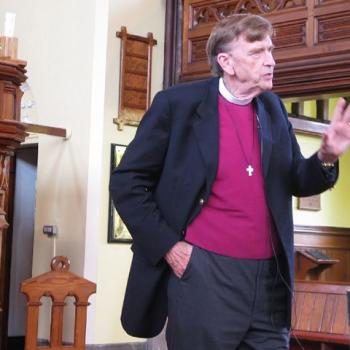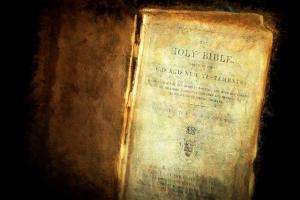
Apart from the slow-smoldering controversy over “Radical Lutheranism”—a subject for another day—Lutherans don’t get up to very much online drama. Instead, I’ve been watching with increasing concern as some serious discontent (which I previously wrote about here) has fomented in the Southern Baptist corner of the web.
Since that last post, the heat has been considerably turned up. Albert Mohler—the dean of Southern Baptist Theological Seminary in Louisville, Kentucky—is a candidate for the denomination’s presidency this year, and critics on the left and right alike have come out of the woodwork to oppose him. Chief among the attacks from the right is the charge that Mohler has led his seminary toward apostasy by platforming and promoting professors with deviant views of Scripture or who endorse “critical theory” in some way.
This controversy came to a head in recent weeks following the dismissal of several Southern Seminary professors for unspecified reasons. Most of the dismissed professors signed nondisclosure agreements, with the exception of Old Testament professor Russell Fuller—a sharp critic of perceived “liberalizing” tendencies at the seminary. Fuller recently went on the record to enumerate his concerns, which center on the scholarship of two professors in particular: Dominick Hernández and Jonathan Pennington.
Just to be clear—I’m not Southern Baptist myself, so technically I don’t have a dog in this fight. But in the same way I think it’s essential for the Catholic Church to have a Pope who’s faithful to the Nicene Christian tradition, I think it’s essential the SBC have a faithful president too. (The invisible Church is far stronger together than when fractured.) And because I’ve spent a good deal of time in the last couple months arguing about American constitutional interpretation, I thought it might be worth poking around in a different corner of the hermeneutical landscape—especially given how this conflict has, in recent weeks, spilled across Christian Twitter more broadly.
I’ll disclose my bias up front: as someone who’s benefited from Mohler’s work for years, I find the latest battery of “liberalism” allegations totally unfathomable. I’ve read the supposed gotcha articles on the various “watchdog” and “discernment” websites out there, and find myself baffled as to how this stuff became so contentious in the first place. I may not have a Ph.D. in biblical theology, but I do have a law degree—and the current controversy strikes me as an open-and-shut case for the defense.
But let’s dig in.
Dominick Hernández
Most of Fuller’s case against Hernández centers on Hernández’s scholarship on the Book of Job, which Fuller apparently believes to suffer from the toxic influence of higher criticism. In particular, Hernández’s work explores the concepts of the “firstborn of death” and the “king of terrors” in Job 18:14. Hernández speculates that these entities may have been understood, in context, as mythological beings connected to the Canaanite deity Mot, ruler of the underworld—and this is the argumentative move that has provoked such outrage. Any language of myth, Fuller contends, must be immediately corrosive to faith in the Scriptures as inerrant.
But I am aware of no definition of inerrancy which would require that the human author’s thought-world be itself inerrant; what is central to the principle is the affirmation that the text itself—which may certainly contain figurative language, as in Isaiah 11:12’s “four corners of the earth”—is inerrant. Regardless of what the Book of Job’s human author might’ve personally believed about cosmology, this talk of the “firstborn of death” and the “king of terrors” obviously refers to forces of death and destruction, much as modern Americans refer to the “grim reaper.”
Surely it is possible that some Americans believe in a literal, personified grim reaper, but the proposition that “all humans by nature fear the grim reaper” would not be falsified if there turned out to be no literal grim reaper. And so too with the book of Job. Nothing in Hernández’s argument—based on the samples released—is incompatible with a commitment to inerrancy as such. Even granting Hernández’s tentative hypothesis that Job’s human author might’ve personally held certain mythological views of the world around him, the reading of the text Hernández proposes is merely incompatible with an absolutist literalism.
Fuller also takes issue with Hernández’s suggestion that Old Testament personifications of Sheol—the grave—reflect “mythological material.” But the Bible repeatedly expresses truths by appropriating the mythic imagery of a surrounding culture. To name but one example, Revelation 20:13 (ESV) proclaims that in the closing moments of the Apocalypse of John, “Death and Hades gave up the dead who were in them.” What is this but the personification of primordial forces for rhetorical effect? And as C. S. Lewis was happy to point out, since God is the author of nature—and some knowledge of Him is naturally accessible to human beings (Romans 1:19–20)—it stands to reason that His designs would be glimpsed within the mythologies of diverse cultures.
Fuller’s sharpest words, though, are reserved for Hernández’s suggestion that the Book of Job, by depicting Job’s frustration over the flourishing of evildoers, subverts the “traditional biblical and ancient Near Eastern wisdom” that the wicked do not prosper. For Fuller, this acknowledgment amounts to Hernández’s introduction of an illicit contradiction into the Bible.
But why must Hernández’s argument be read as uncharitably as possible? How does Hernández’s point not simply echo David’s cry in Psalm 73:3 (ESV) that he “was envious of the arrogant when [he] saw the prosperity of the wicked”—or, for that matter, the entire Book of Ecclesiastes, which carries this instinct to the point of despondence? To be human is to be frustrated with the seeming success of the greedy and impious, and the heroes of the Bible freely give voice to that frustration.
Finally, Fuller critiques Hernández’s view that Ancient Near East materials can prove helpful for understanding the Bible’s word-forms and concepts. This should be entirely uncontroversial: of course extrinsic historical sources can be helpful as a means of avoiding the tendency to read modern presuppositions back into the text. By way of comparison, the Federalist Papers are helpful for interpreting the Constitution, because they shed light on what words meant when initially penned. But they are not themselves the supreme law of America, nor do they supersede the Constitution. Denying that extrinsic materials can ever play an important role in interpretation would risk producing a Bible made in the image of 21st-century Americans, rather than a Bible given by God at a particular moment in time. (And this in no way amounts to a denial of the maxim that “Scripture interprets Scripture”—a commitment to the unity of the text and a commitment to understanding word meanings are both required.)
In short, Fuller’s claims that Hernández is trafficking in “liberalism” fail. There is nothing here remotely akin to the mythologizing hermeneutics that triggered the “Seminex” controversy in the Missouri Synod during the 1970s, or the SBC’s “Battle for the Bible” in the 1980s—merely a scholar committed to working through the historical environment in which the text emerged.
Jonathan Pennington
Fuller’s case against New Testament professor Jonathan Pennington is similarly threadbare. At bottom, Fuller’s argument reduces to an objection to Pennington’s recognition that biblical hermeneutics is a difficult business, and is properly conducted within the community of the Church.
That point should not be controversial—certainly not for conservatives. Surely one never approaches a text, or anything else for that matter, from a purely “neutral” perspective: all people are inevitably shaped by the traditions of thought they inhabit and that are given to them through education, socialization, and culture. There is no intellectual “view from nowhere,” because everyone engages the world through the prism of their personal histories and experiences.
Lest I be accused of suffering from the taint of postmodernity myself, I note that everything I’ve just written was drawn from the work of conservative philosopher Alasdair MacIntyre, certainly no proponent of critical theory. This certainly isn’t to say that there’s no objective truth or meaning—far from it! Rather, it’s the acknowledgment that all communication involves the risk that the message simply won’t be understood by someone else. Or, put more straightforwardly, we’re always going to be tempted to read the Bible in ways that fit our preconceived notions, whatever those may be. We can certainly do our best to be as objective as we can, but at the end of the day must always admit the possibility of our own fallibility. None of this is outside the pale of Christian orthodoxy, and none of this establishes that Pennington “fundamentally misreads Scripture because of his Post-modern framework.”
Elsewhere, Fuller accuses Pennington of “den[ying] the unity of Scriptures by denying a ‘pre-existing messianic paradigm’ in the Old Testament that is fulfilled in the New Testament” in light of Pennington’s acknowledgement of a “vast historical break between all known forms of pre-Christian messianic expectation and the confident apostolic claims of messianic fulfillment in Jesus of Nazareth.” To state Fuller’s claim is to refute it: Pennington acknowledges “pre-Christian messianic expectation,” but points out (correctly) that Jesus surprised his contemporaries by coming as a Savior who is crucified, not as a conquering king.
Perhaps most importantly, Fuller charges Pennington with “den[ying] the sufficiency of Scripture through his view of the rule of faith/creeds”—because Pennington argues that “our reading of the Bible is inevitably and should be constrained by creedal orthodoxy/regula fidei/confessions.” Here, I think a good old-fashioned Lutheran concept helps out. Quia subscription to the Lutheran Confessions, which all Missouri Synod pastors are required to profess, entails embrace of the Confessions because (quia) they interpret Scripture faithfully and reflect the testimony of the Church catholic.
This historical tie is crucial, because to deny that the testimony of the Church bears in any way on interpretation—as Fuller seems to advocate—is to turn the Scriptures into a tabula rasa subject to interpretations far removed from any accessible original meaning. Creeds and confessions are historical lodestars warning the Church, in its interpretive work, not to depart from the substantive content of the faith delivered to the saints. And Pennington’s recognition of this point makes Fuller’s charge of postmodernism even less coherent: the whole point of creeds and confessions is to prevent a slippage of meaning into subjectivism.
In short, Pennington is clearly no nihilist about the possibility of true interpretation. Just as before, Fuller’s accusations miss the mark.
Critical Theory
The final wave of critiques against Southern Seminary centers on the alleged promotion of material rooted in critical theory (in particular, critical race theory). I’ve already written about this issue, as has my friend Timon Cline, so I won’t belabor the point again here. Suffice it to say that I think critical theory tends to be extraordinarily destructive of any system into which it’s introduced, and I don’t agree with teaching it as normative in a seminary context.
But that said, there was a time in my life—before I had a better sense of the provenance of these ideas and their ultimate destination—when I was more comfortable using the language of contemporary critical theory in everyday conversation. I don’t do this anymore, because I’ve learned that certain seemingly fruitful ideas come with an awful lot of questionable metaphysical baggage. If one wants to talk about subjects like racial unity and economic justice, there are many fruitful tools in the broader Christian tradition (that is, the tradition beyond American evangelicalism) that don’t come with that same baggage. But this wasn’t something I uncovered overnight: it took a good deal of reading to follow the genealogy to its end.
In the current SBC controversy, almost everyone who’s been accused of promoting or platforming critical theory has strongly disavowed its somewhat Nietzschean trajectory. I see every reason to take them at their word, and no reason whatsoever to assume a malign conspiracy behind the scenes.
Final Thoughts
At the end of the day, frankly, I have no interest in defending every single line Hernández and Pennington have ever written (for one thing, I’d disagree with Pennington that it was virtually impossible for Jesus’s contemporaries to have connected his ministry to the Old Testament’s messianic promises). What I’m interested in is whether the recent charges against Mohler and crew—that they’ve knowingly invited higher criticism and liberal theology into the SBC’s bastion of orthodoxy—have any purchase. And if this is the best evidence the SBC watchdogs can muster, it’s pretty thin. (At the risk of mudslinging, there’s at least some reason to believe that the recent controversy is driven by anger over the SBC’s increased willingness to turn a critical eye on its history.)
As yet, Lutherans aren’t having this same debate. But maybe they will someday, and it seems to me that it’s always worth advancing a hermeneutic of charity—at least where the grounds for outrage are as insubstantial as these. If we take seriously 1 Corinthians 13’s exhortation to bear all things, believe all things, hope all things, and endure all things, doing so may be nothing less than our Christian duty.












